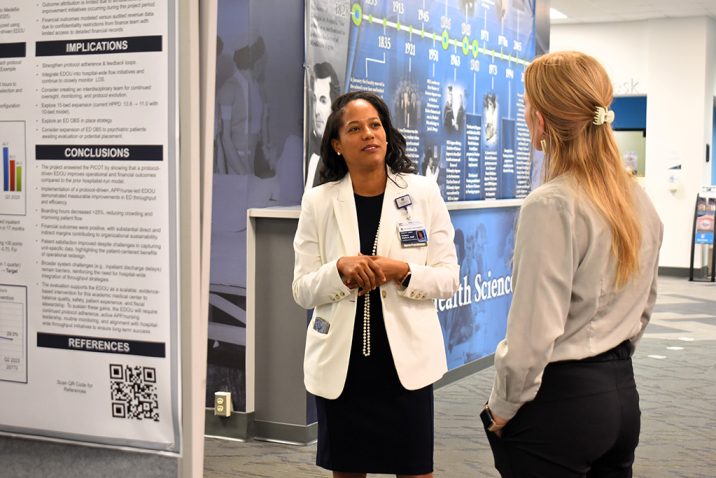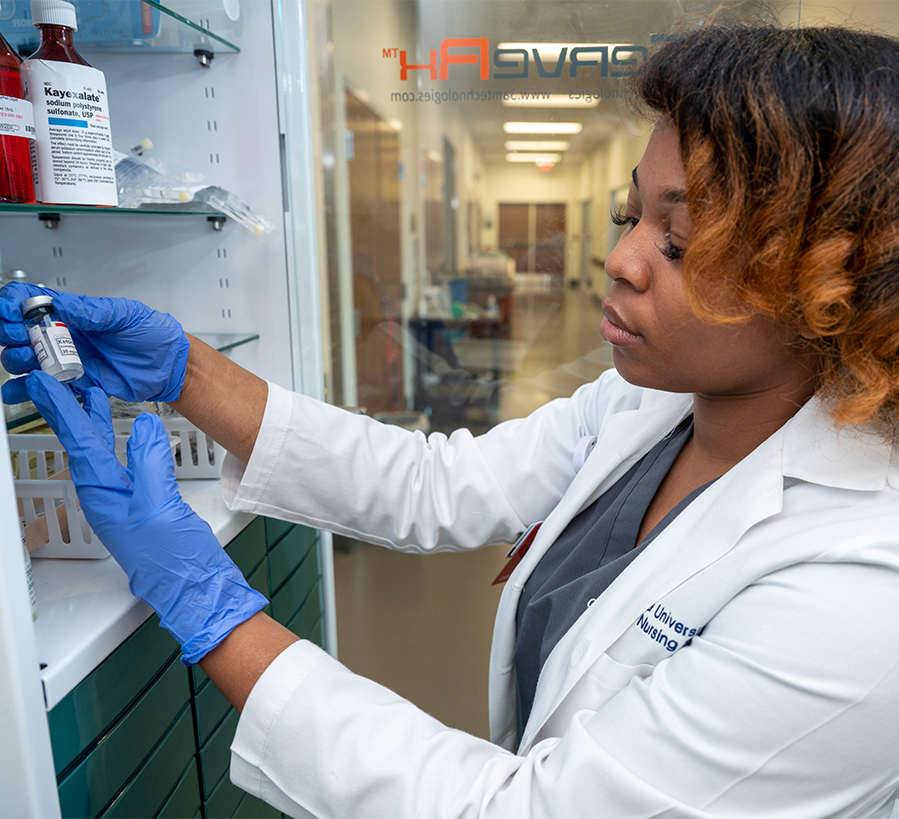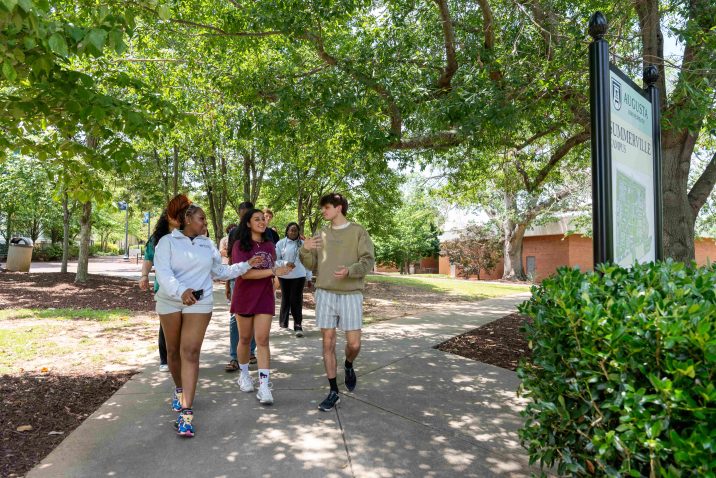Nursing
Advance your nursing career in the Augusta University (AU) PhD in Nursing program.
The program is research-focused and features interdisciplinary research opportunities
in multiple areas, such as cardiovascular health, community-based participatory interventions,
and health promotion.
The AU PhD in Nursing program is a hybrid program that is accessible to busy professionals.
The program features faculty mentoring and teaching, extensive research experiences,
and committed peers, emphasizing interdisciplinary knowledge development and dissemination.
Dissertation research may occur at approved sites near home or work. For DNP-prepared
nurses, course credit may be given for previous coursework. This Doctor of Nursing
(PhD) program through the College of Nursing is a research-focused degree that prepares nurse scientists for research-intensive
academic careers.
The AU PhD in Nursing program equips you with interdisciplinary skills to lead and
apply scientific knowledge in healthcare. You’ll explore ethical, political, economic,
and cultural issues, evaluate health theories, and design studies to improve community
care.
Nursing is for you if you consider yourself
Life-Changing
Life-Saving
Education
Want to learn more about the Nursing program at Augusta University?
Request InfoWhat You'll Study
Coursework
Individuals can enroll in the PhD in Nursing program as a part-time or full-time student.
Full-time students can complete the program in three years.
The curriculum is tailored to each student’s research area and includes two summer
research-intensive workshops. Distance-accessible/hybrid coursework includes core,
research mentorship, elective, and dissertation courses.
Curriculum | Admissions Criteria | Tuition and Fees | Application Deadlines



EXPLORE. EXCEL. EXPAND.
Graduate School Advantage
Augusta University's graduate programs are among the best in the nation – and the world – and our graduate students are our most valuable assets. To ensure that our students earn more than a degree, the Graduate School offers a range of opportunities so they can develop the leadership, communication and personal skills needed for a rewarding life and academic, research or professional career.
See what the Graduate School has to offer »
About the Graduate SchoolExperience-based Education
Outside the Classroom
Founded in 1828, Augusta University has a long-standing history in Georgia and offers
interdisciplinary programs in medicine, dental medicine, nursing, allied health, cyber,
and more. It is home to several prominent research centers, including the Georgia
Cancer Center, Center for Nursing Research, Center for Healthy Aging, and the Georgia
Prevention Institute.
Graduate assistantships—both teaching and research—offer financial support and professional
experience. Full-time employees at University System of Georgia (USG) institutions
may use the Tuition Assistance Program (TAP) to cover most tuition costs. Additional
financial aid options include scholarships and low-interest student loans.
Graduate nursing students may be eligible for the Nurse Faculty Loan Program (NFLP),
funded by HRSA. The program forgives up to 85% of the loan for students in good academic
standing who commit to four years of full-time teaching in an accredited nursing program
after graduation. Funding is limited and awarded on a first-come, first-served basis.
Research Assistance
The Center for Nursing Research helps facilitate faculty and student efforts to obtain external funding to support research or educational and service demonstration projects.
Loan Program
The Nurse Faculty Loan Program helps students cover educational costs, and eligible students can have up to 85% of this loan forgiven while serving as a full-time nurse faculty member at an accredited nursing school.
Research-Oriented
The program is designed with a research focus and emphasizes interdisciplinary knowledge development through collaboration with faculty mentors in nursing and related disciplines.
Advanced Facilities
State-of-the-art technology abounds on the Health Sciences Campus, including at the Interdisciplinary Simulation Center, where students can advance their research interests in exciting ways.
Your Future
Career Options
A PhD in Nursing from Augusta University opens the door to advanced roles in research,
academia, and healthcare leadership. Graduates are well-positioned for careers as
nurse scientists, faculty members, academic leaders, healthcare executives, and more.
The demand for PhD-prepared nurses continues to rise, driven by the need for innovative
research, evidence-based practice, and the education of future nurses.
According to the U.S. Bureau of Labor Statistics, employment in medical research
is projected to grow by 6% over the next decade—faster than the average for all occupations—highlighting strong
career prospects for nurse researchers.
Profiles
Student Stories
As the healthcare environment rapidly changes, PhD prepared nurses are uniquely prepared to generate knowledge leading to vital clinical change.
Steven Waldrop
I believe every day I have a purpose, and completing this degree increases my capabilities to serve, impact positive outcomes, and increase success for individuals at our University and the community at large.
Shelli Larkin
Admissions Criteria at a Glance
GPA: A minimum overall undergraduate grade point average (GPA) of a 3.0 a 4.0 scale and a minimum overall graduate GPA of a 3.2 on a 4.0 scale.
Degree Requirement: Bachelor of Science in nursing (BSN) from an accredited program and an accredited college or university. A Master’s degree or higher with a major in nursing (MSN, MN, DNP) alone may fulfill the minimum degree requirement.
Transcripts: Official transcripts are required from all universities and colleges ever attended. Unofficial transcripts from US colleges and universities can be used in the admissions review process in lieu of official transcripts for this program.
Standardized Test Requirements: None are required for this program.
Prerequisite Coursework: 3 credit hours in statistics or biostatistics with a "B" or higher.
Letters of Recommendation: Recommendations from three individuals must be submitted through the application portal.
Resume or CV: Applicants must submit a resume or curriculum vitae within the application portal.
Writing Samples: An essay addressing experience and autobiographical information as well as an original paper reflecting research ability must be submitted within the application portal.
Licensure: Nurse applicants must currently hold an unrestricted RN license and be eligible for an unrestricted RN license in the state of Georgia.
Criminal Background Check and Drug Screen: Completion of criminal background check (CBC) and drug screen with results deemed satisfactory.
International Students: Please review the verification process for international transcripts and the english proficiency requirement.
Tuition & Fees Estimate
$4,801*
Estimated total
Full-time / In-State / Per Semester
$401
Tuition Per Hour
$675
Mandatory Fees
View Detailed Program Tuition
*Tuition & Fees listed here are for in-state students enrolling in the university for Fall 2025 semester.
Detailed Program Tuition InformationApplication Deadlines
Fall '26 Priority Application Deadline
- May 15, 2026
Fall '26 Application Deadline
- June 15, 2026 (application opens August 8, 2025)
Early submission of all application materials is strongly advised.
All required application materials and documents must be received in order for an application to be considered complete and before an admission decision can be made. The program does not accept applications after the published application deadline, however the program will continue to accept application materials up to 2 weeks after the application deadline.
The Student and Exchange Visitor Information System (SEVIS) Form I-20 for F-1 student status or Form DS-2019 for Exchange Visitor (J-1) Status cannot be issued by Augusta University for enrollment in this hybrid program per U.S. immigration regulations. Questions? Please email International & Postdoctoral Services Office at ipso@augusta.edu.
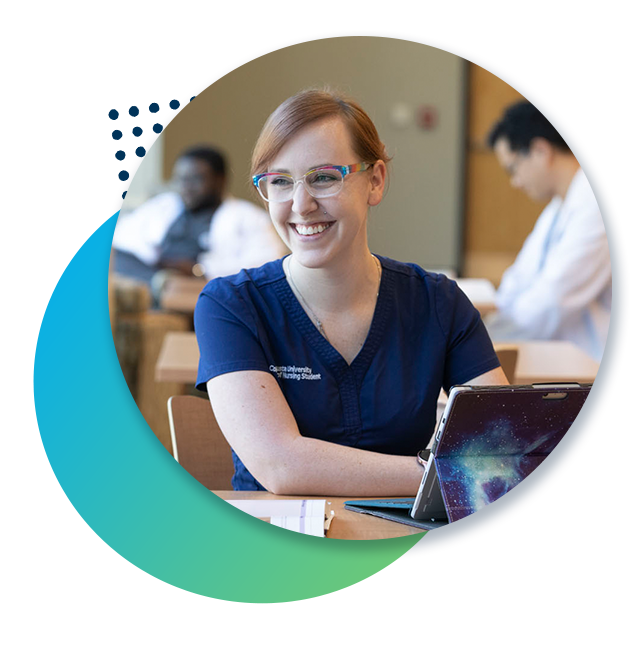
Why Augusta?
Opportunities to engage in groundbreaking research in areas like cancer, health disparities and diabetes and epigenetics prepare you for research-intensive careers in academia.
Scholarships, assistantships and loan programs make the program financially accessible.
Community partnerships provide valuable experience while giving you the chance to improve health outcomes for a variety of communities.
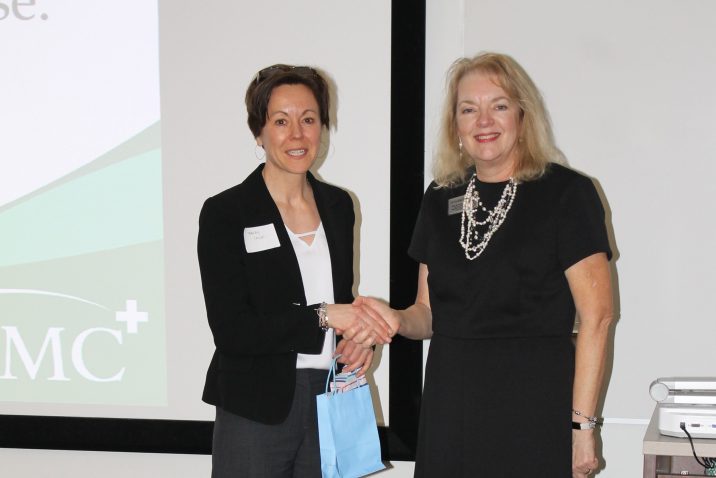
Nursing PhD student aims to advance stroke-related research, care
Nursing PhD student aims to advance stroke-related research, care